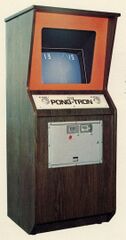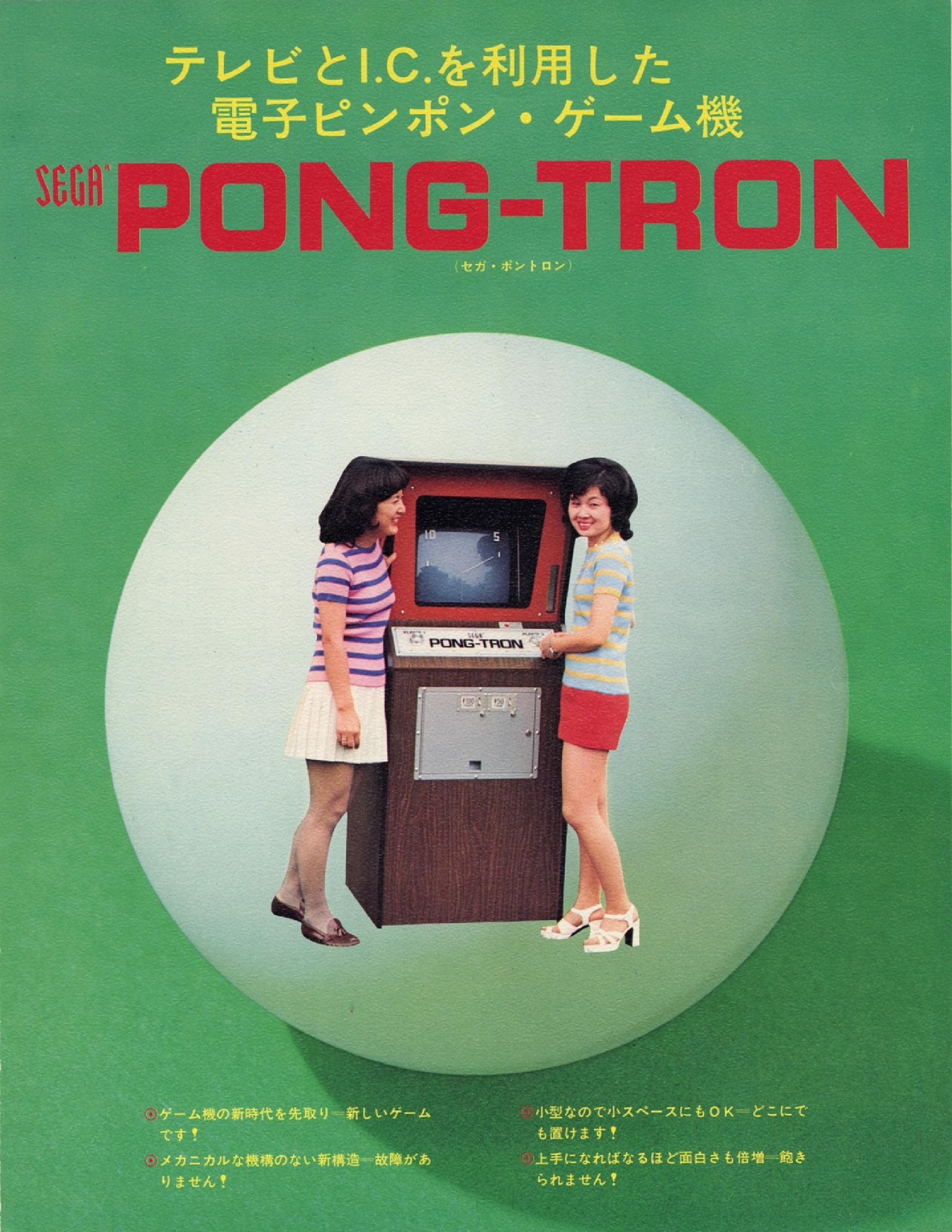Difference between revisions of "Pong-Tron"
From Sega Retro
| Line 16: | Line 16: | ||
{{sub-stub}}'''''{{PAGENAME}}''''' (ポントロン) is a 1973 discrete logic arcade game produced by [[Sega Enterprises, Ltd.]] It is a clone of [[Atari, Inc. (1972–1984)|Atari]]'s ''[[wikipedia:Pong|Pong]]'' (1972) built specifically for Japanese audiences. | {{sub-stub}}'''''{{PAGENAME}}''''' (ポントロン) is a 1973 discrete logic arcade game produced by [[Sega Enterprises, Ltd.]] It is a clone of [[Atari, Inc. (1972–1984)|Atari]]'s ''[[wikipedia:Pong|Pong]]'' (1972) built specifically for Japanese audiences. | ||
| − | ''Pong-Tron'' differs very little from Atari's offering, however this release is significant. It stands as Sega's first arcade game to incorporate a CRT monitor and thus be classed as a | + | ''Pong-Tron'' differs very little from Atari's offering, however this release is significant. It stands as Sega's first arcade game to incorporate a CRT monitor and thus be classed as a video game. Prior to ''Pong-Tron'''s release, Sega had built its success through electro-mechanical arcade games, pinball tables, slot machines and jukebox distribution. While earlier Sega electro-mechanical arcade games resembled video games, from ''[[Duck Hunt]]'' (1968) to ''[[Killer Shark]]'' (1972), ''Pong-Tron'' was Sega's first true video game. It was also one of the first video games released in Japan, along with [[Taito]]'s ''Elepong'' the same month, predating the arrival of [[Namco]]'s official release of Atari's ''Pong'' later that year. |
''Pong-Tron'' followed later in the year by the updated ''[[Pong-Tron II]]'' (and ''[[Hockey TV]]'', another pseudo-''Pong'' clone). The housing was also recycled for ''[[Balloon Gun]]''. Sega's main competitor at the time, [[Taito]], also released a similar Japanese clone in the form of ''Elepong'', also in 1973. | ''Pong-Tron'' followed later in the year by the updated ''[[Pong-Tron II]]'' (and ''[[Hockey TV]]'', another pseudo-''Pong'' clone). The housing was also recycled for ''[[Balloon Gun]]''. Sega's main competitor at the time, [[Taito]], also released a similar Japanese clone in the form of ''Elepong'', also in 1973. | ||
Revision as of 00:46, 27 November 2024

| |||||||||

| |||||||||
| Pong-Tron | |||||||||
|---|---|---|---|---|---|---|---|---|---|
| System(s): Discrete logic arcade | |||||||||
| Publisher: Sega Enterprises, Ltd. | |||||||||
| Developer: Sega Enterprises, Ltd. | |||||||||
| Genre: Action | |||||||||
| Number of players: 2 | |||||||||
|
This teeny-tiny article needs some work. You can help us by expanding it.
Pong-Tron (ポントロン) is a 1973 discrete logic arcade game produced by Sega Enterprises, Ltd. It is a clone of Atari's Pong (1972) built specifically for Japanese audiences.
Pong-Tron differs very little from Atari's offering, however this release is significant. It stands as Sega's first arcade game to incorporate a CRT monitor and thus be classed as a video game. Prior to Pong-Tron's release, Sega had built its success through electro-mechanical arcade games, pinball tables, slot machines and jukebox distribution. While earlier Sega electro-mechanical arcade games resembled video games, from Duck Hunt (1968) to Killer Shark (1972), Pong-Tron was Sega's first true video game. It was also one of the first video games released in Japan, along with Taito's Elepong the same month, predating the arrival of Namco's official release of Atari's Pong later that year.
Pong-Tron followed later in the year by the updated Pong-Tron II (and Hockey TV, another pseudo-Pong clone). The housing was also recycled for Balloon Gun. Sega's main competitor at the time, Taito, also released a similar Japanese clone in the form of Elepong, also in 1973.
Specifications
Dimensions
- Mass: 79kg

